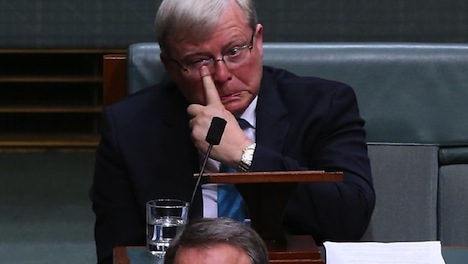It’s hard to find anyone in Australia who lacks strong feelings about former prime minister Kevin Rudd.![]()
Some Australians believe that Rudd is among the most talented politicians of his era, who led Australia’s Labor Party out of the wilderness and into government in 2007, who set the stage for a landmark carbon pricing scheme (that Australia’s new center-right prime minister Tony Abbott now hopes to repeal), and who earlier this year salvaged what would have been a landslide loss of devastatingly historical proportions under Labor prime minister Julia Gillard.
Some Australians believe that Rudd, for all his political gifts, is a temperamental figure who failed to push through legislative accomplishments and whose dysfunctional leadership inevitably led to the 2010 putsch that ousted him and installed Gillard as Labor Party leader and as prime minister. They also believe that his constant briefing after the 2010 leadership change almost fatally wounded Gillard and Labor in the August 2010 election, and that as foreign minister between 2010 and 2012, Rudd continued to harm Gillard to the point that a desperate Labor caucus turned to Rudd at the last minute in June 2013 to save them from impending electoral doom.
That’s why there was simply no way that Labor can fully move forward from the poisonous Rudd-Gillard era while Rudd continues to sit in the Australian parliament — and that’s why Rudd stepped down on Wednesday from his Queensland seat in the House of Commons, which he had held continuously since 1998.
As Rudd himself noted in his announcement that it was ‘time to zip,’ it’s become a precedent that former prime ministers on both the left and the right leave parliament shortly after losing elections:
“It was right and proper that I report my decision to the Parliament at the earliest opportunity. “That day is today. I have chosen to do so now to create minimal disruptions to the normal proceedings of the house.
“My predecessors as prime minister, Whitlam, Fraser, Hawke and Keating, reached similar decisions to leave the Parliament before the subsequent election. As did would-be prime ministers, Costello and Downer, perhaps prime minister Howard would have done the same had he retained the seat of Bennelong, although we will never know.”
The sharp ding at Howard was classic Rudd — Howard famously lost his seat in the 2007 landslide that ushered Rudd and Labor to power. Rudd himself faced a difficult fight in the September 2013 election, though he ultimately survived a strong Liberal challenge (moreover, it’s not certain that Labor will retain the seat now that Rudd is resigning).
Labor and Rudd won just 46.55% of the ‘two-party preferred’ vote and just 55 seats in the House of Representatives, the lower house of the Australian parliament — a net loss of 17 seats. Abbott, leader of the Liberal Party and the broader coalition with the National Party, led the Coalition to 53.45% of the vote and 90 seats.
In October, Labor elected Bill Shorten, a former financial services minister and workplace relations minister, as its new leader in a two-way race against former House leader Anthony Albanese. Shorten was among a handful of MPs who shifted the balance of power from Gillard to Rudd earlier this summer (after supporting Gillard’s putsch in 2010), though Albanese had been a longtime Rudd ally. The leadership campaign was the first to take place under new rules that stipulate an equal 50-50 role for each of the rank-and-file Labor membership and the Labor parliamentary caucus in selecting the party’s leader. Despite the fact that Shorten represented the right wing of the party and Albanese the left wing, and despite the fact that Shorten won the Labor caucus vote and Albanese won the rank-and-file vote (by a smaller margin), the campaign featured relatively little of the rancor that marked the Rudd-Gillard era.
But given the extent of Rudd’s hunger for power — and his political talent for making comebacks — it would have been impossible for Labor to draw a sharp policy contrast to Abbott with Rudd still hanging around Canberra.
Rudd will leave just as the first big fight of the Abbott era is gearing up — the Coalition’s push to dismantle the carbon pricing scheme. Abbott’s Coalition doesn’t control a majority of the Senate, the upper house of the Australian parliament, and Shorten has pledged to oppose Abbott with vigor. But if Labor and its allies in the Senate, the Australian Greens, twice vote to oppose Abbott’s plan to dismantle the climate change legislation, Abbott can call a ‘double dissolution’ election — meaning that Australia will hold fresh elections to choose the members of the entire parliament (in typical elections, as in the most recent September 2013 vote, only around one-half of the Senate’s members are up for election).
The prospect of a high-stakes double dissolution so soon into Abbott’s new government is already the top political strategic concern for all of Australia’s political parties — the last time a double dissolution election was held more than a quarter-century ago under Labor prime minister Bob Hawke.
The Australian Greens, under leader Christine Milne, have virtually no choice but total opposition to Abbott’s plans.
The double dissolution strategy isn’t without risk for Abbott, who could face the wrath of the Australian electorate (and his relatively strong majority in the House of Representatives) by calling a new election so shortly after becoming prime minister.
The consequences are even higher for Shorten and Labor, however, who risk losing even more seats in an election over an unpopular carbon tax (and without Rudd’s charm to limit Labor’s losses, especially in Rudd’s home state of Queensland). But Labor would also risk being seen as ideologically bankrupt if it fails to defend its carbon pricing law, the chief legislative accomplishment of its six years in government between 2007 and 2013.
Photo credit to Kym Smith.

One thought on “Rudd’s departure from Australian politics vital to Labor’s future”